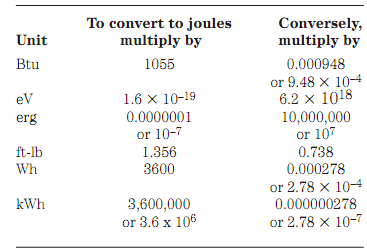Energy units
As said earlier, physicists prefer using joule or watt second, as their energy unit. This is the standard unit for the scientific purposes. Another unit is erg, equivalent to one ten-millionth of a joule. This is said to be the amount of energy required by a mosquito to take off after it has bitten you. The erg is used in lab experiments including small amounts of expended energy.
You have heard of the British thermal unit (Btu), equivalent to 1055 joules. This is the energy unit often used to indicate heating or cooling capacity of air-conditioning equipment. To cool your room from 85 to 78 degrees requires certain amount of energy, best specified in Btu. If you are getting an air conditioner or furnace which is installed in your home, an expert will come look at your situation, and determine the size of air conditioning unit, in Btu, that best suits your requirements. It doesn't make any sense to get one that is way too big; you will be wasting your money. But you want to be sure that it is big enough-or you will also waste money due to inefficiency and possibly due to frequent repair calls.
Physicists use, in addition to the joule, a unit of energy called as electron volt. This is an extremely small unit of energy, equal to just 0.00000000000000000016 joule. The physicists write 1.6 × 10-19 to represent this. This is the energy gained by a single electron in the electric field of 1 V. Atom smashers are rated by millions of electron volts or billions of electron volts of energy capacity. You might even hear in future of a huge linear accelerator, built on some vast prairie, and are capable of delivering trillions of electron volts.
Another energy unit, employed to denote work, is the foot pound (ft-lb). This is the work needed to raise a weight of one pound by a distance of one foot, not including any friction. It's equal to 1.356 joules.
All of these units, and conversion factors, are given in Table 2-3. Kilowatt hours and watt hours are also included in this table. You don't really need to worry about the exponential notation, known as scientific notation, here. In electricity and electronics, you are to be concerned only with the watt hour and the kilowatt hour for most of the purposes, and the conversions hardly involve numbers so huge or so miniscule that you will require scientific notation.
Energy units.
